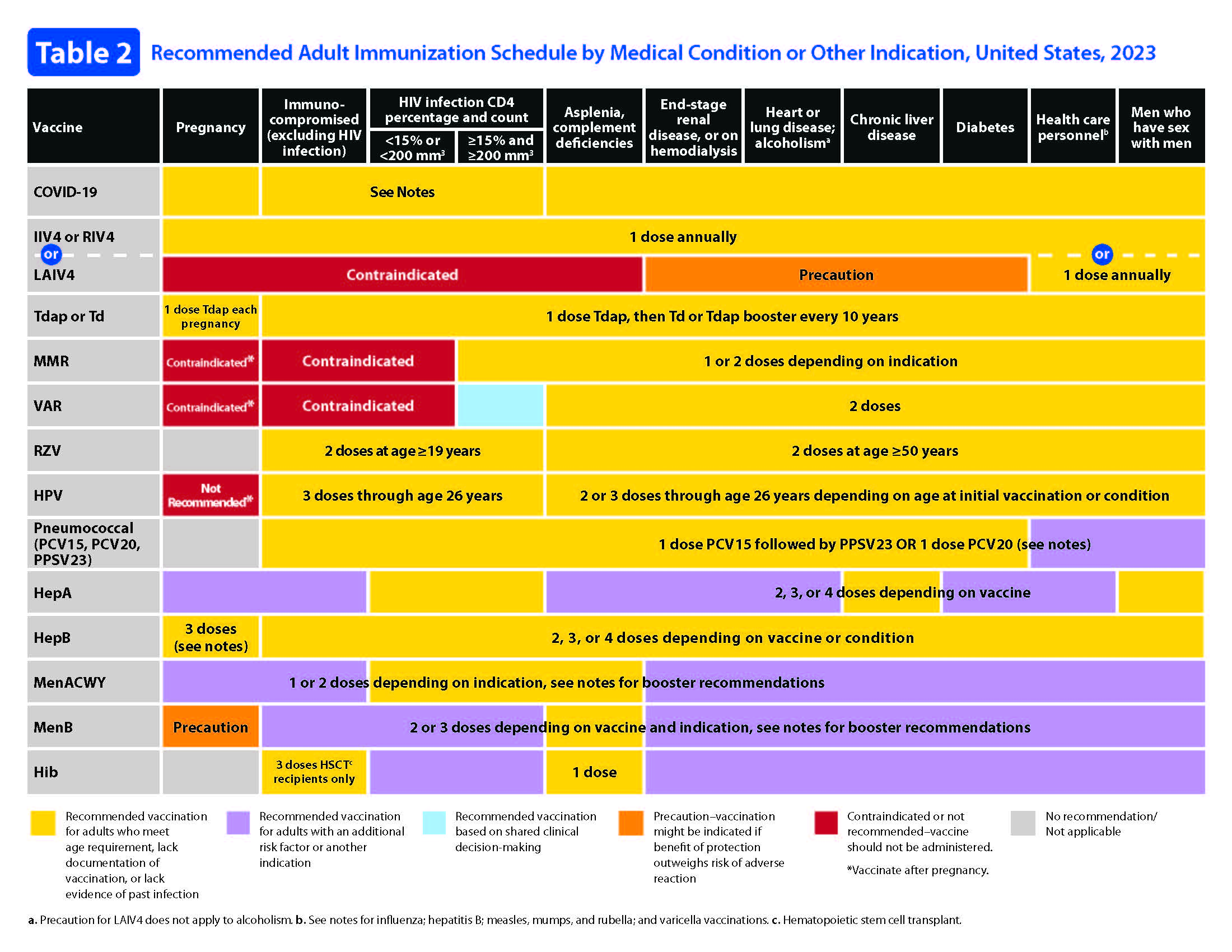When was the last time you had a vaccination? Perhaps it was when you were a kid or during the COVID-19 pandemic. But did you know that adults need to continue getting certain vaccinations throughout their lifetime to prevent the spreading of infectious diseases?
Schedule your vaccines with a ChristianaCare primary care provider here or call 302-777-0643.
Vaccines save lives by preventing disease
Vaccines, also known as immunizations, help reduce the spread of disease and prevent epidemics. They are usually given as a shot (injection). You may have heard of other disease treatments like monoclonal antibodies or other therapies to treat infections but vaccinations safely prevent infections from happening in the first place.
3 reasons adults should get vaccines
- Although you may have received several rounds of vaccinations when you were a child, not all vaccines last your entire life. Some need periodic boosters. Others are for diseases that won’t affect you until you get older, so you’ll need protection during your senior years.
- Some vaccines are now given in childhood that current adults didn’t receive when they were children. They weren’t available yet. Depending on the disease and age range, some vaccines can still be given to a current adult if they didn’t receive them as a kid.
- Vaccinations can help prevent the spread of disease not only to other adults but from adults to children.
Real-world examples:
- Tdap (tetanus, diphtheria, pertussis) is great for new grandparents to avoid spreading whooping cough to grandchildren.
- Pregnant moms should get their flu shot (in season) and COVID-19 vaccines while pregnant, if possible. This protects mom and baby once the baby is born. Pregnant moms should be aware that pregnancy is a risk factor for severe flu and severe COVID-19.
- Anyone else (dads, grandparents, nannies, etc.) should be vaccinated to protect the baby for the first six months. The baby can’t get the flu or COVID-19 shot until they are six months old – but everyone else around them can and should get their flu and COVID-19 vaccinations before the baby is born. Click here to learn more about child immunizations.
Did you know?
Vaccination is the term for when you receive a vaccine through an injection, sprayed into the nose or given orally in the mouth. The vaccine itself is a substance used to stimulate the body’s immune response against diseases.
Where can I get vaccines?
Pharmacies are the most common place to receive vaccines. They will offer almost all the vaccines mentioned in this post, and it’s usually easy to make an appointment.
You can also get vaccinated at your primary care provider’s office, but not all primary care providers will carry all vaccines. Talk with your PCP. Public health offices often host vaccination clinics throughout the year for certain vaccines like Mpox, flu, and COVID-19. Most vaccines are covered through insurance or available through public vaccine clinics for the underinsured.
What do I get and when?
We know it can be confusing to know what you need to get and at what age. Here’s the breakdown.
- Flu (influenza) – all ages, every year.
- Human papillomavirus (HPV) up to age 26 – one three-dose series per lifetime. If you are between the ages of 27 and 45, talk with your provider.
- Pneumococcus (bacteria that causes pneumonia and other diseases):
- Everyone 65 and older.
- Younger adults can receive it based on additional risk factors.
- Depending on which series, you might need a booster.
- Shingles – ages 50 and older receive a two-dose series – once per lifetime.
- Tdap (tetanus, diphtheria, pertussis) all ages – every 10 years.
- Hepatitis B – everyone up to age 64. This may be a two- or three-dose primary series – once per lifetime. People 65 and older interested in receiving it should talk with their provider.
- COVID-19 – all ages every year, depending on the current CDC guidelines.
- Currently, only the bivalent booster is recommended, even if you’ve never received any prior COVID-19 vaccines. This fall, we expect an updated booster that targets the XBB variants that are now circulating.
- Check with your primary care provider for the most current guidelines.
An immunization schedule is recommended by the CDC (Centers for Disease Control) for adults. Associated notes are frequently added, so make sure to check back for new information.
Special case scenarios
Some vaccines are not recommended for everyone but may be appropriate for some adults depending on their condition(s) or other factors.
- RSV (respiratory syncytial virus) – 60 and older with shared clinical decision-making. Talk to your provider about specific risks and benefits.
- Note: This is a new vaccine for a respiratory illness that largely affects infants, but it’s just about as common as the flu in older adults. RSV can cause significant disease in people 60 and older.
- Mpox (monkeypox) – recommended for certain people based on risk. Talk to your provider for shared clinical decision-making.
Are there side effects to getting vaccines?
Each vaccine can have different side effects and contraindications depending on the ingredients. A sore arm is the most common side effect.
Serious side effects or adverse reactions from any of these vaccines are very rare. Their overall benefit is felt to far outweigh any risk for the majority of the population. Talk with your provider about the vaccine information statement published by the CDC, which you can review online in multiple languages and includes the details for each vaccine.
Get your shots!
Stay on top of your vaccines for your entire lifetime. Most of the vaccines you received when you were younger will protect you, but adults must keep up with them to remain healthy. As adults age, their immune system weakens, and they may need boosters to prevent infection and complications. The lifelong love of your health is worth the effort. Remember, our experts are here to help you stay on track. To learn more, or schedule an appointment, contact a primary care provider at ChristianaCare online or call 302-777-0643.





